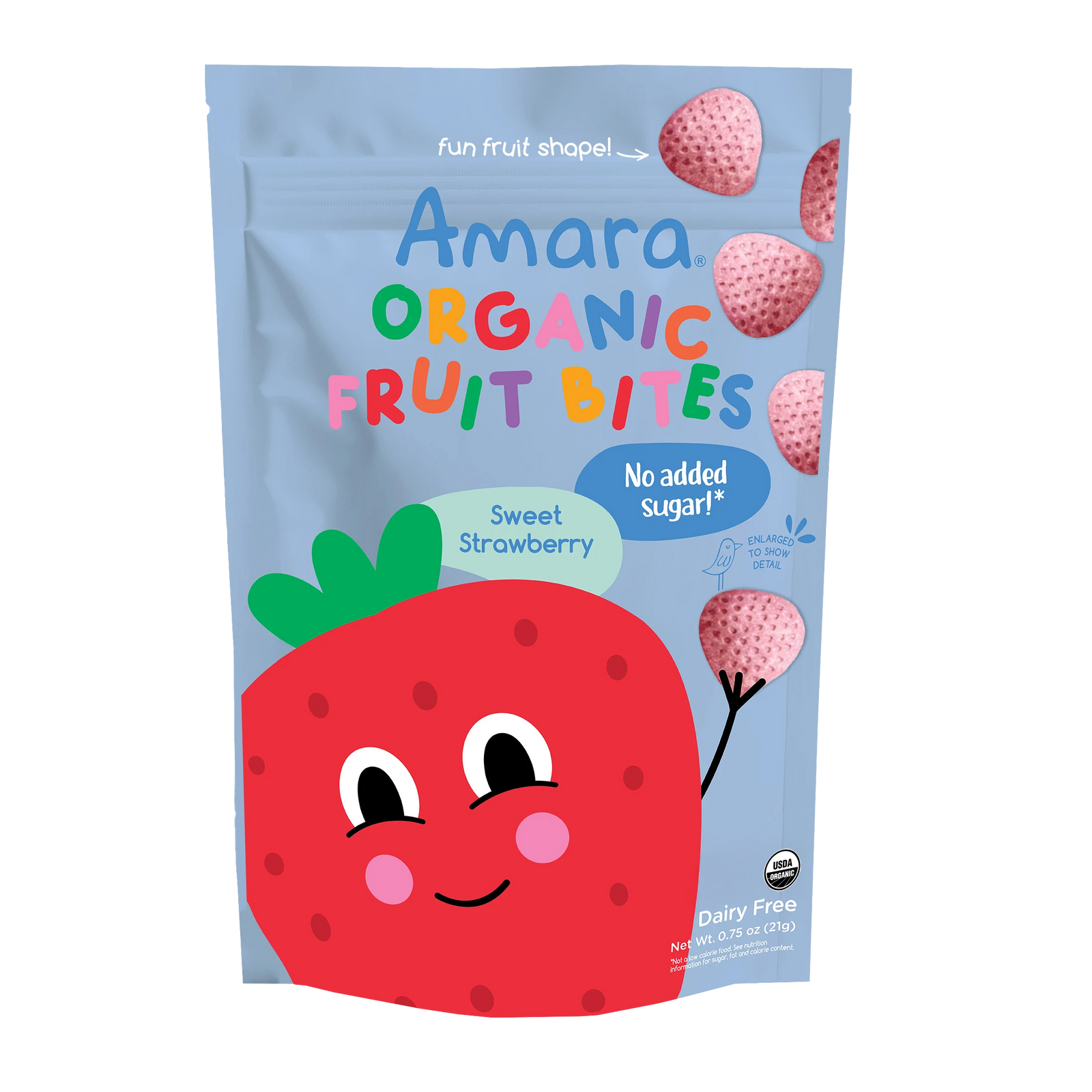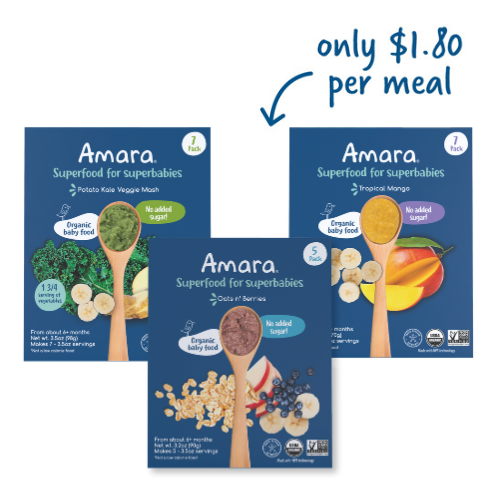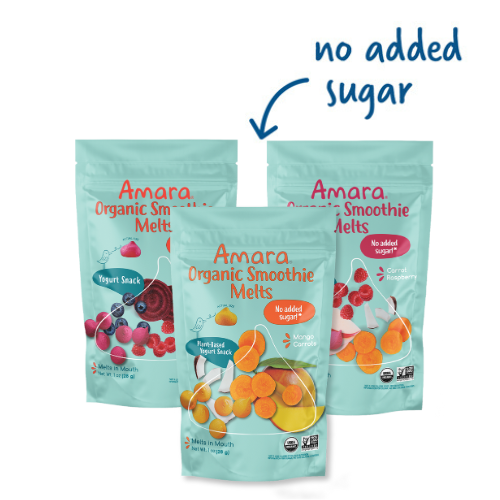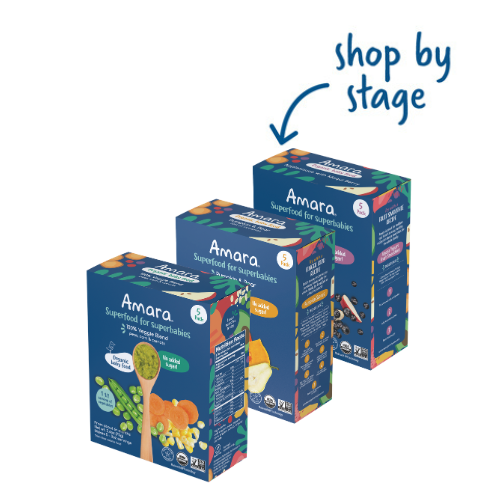Tummy Troubles?
How to Best Support Baby's Digestion
Solid Foods, Inflammation, and Poop

Be Poop-pared
As your baby’s digestive system matures, they will start to experience different signs of solid food readiness. When you and your pediatrician have decided your baby is ready, you’ll notice their digestion go through several changes. In the transition from breast milk to solid foods, one of the first things most parents notice is that baby’s poop will change. Yes, never before did you think you would talk and think and worry so much about poop.
When your baby is on a liquid diet of breast milk, their gut is prepared and can easily absorb it. When you start introducing solid foods to your baby’s diet, their poop will start to reflect how easily food is passing through the digestive system. One of the reasons why pediatricians recommend introducing solid foods one at a time is so you can start to understand how your baby reacts to each food. Pay attention to your baby’s poop. It will show how easily your baby is digesting each food and help alert you to any possible allergic reactions.
Also if you are still breastfeeding, everything you eat gets passed to your baby. If your baby is constipated or has diarrhea, consult with your pediatrician to look at what you are eating that could be unintentionally causing a reaction.

Most Poop-ular Digestive Issues in Baby
1.) Diarrhea
Baby is experiencing diarrhea if they are suddenly having more bowel movements than usual and/or their stools are runnier than usual. Diarrhea in babies is very common, and most cases will clear up on their own. Contact your pediatrician if the diarrhea is accompanied with signs of dehydration, blood in stool, or high fever.
If your baby is battling a typical case of baby diarrhea, you want to find binding foods to help firm up their poop. Also remember to continue to offer baby lots of liquids to keep them well-hydrated. Some foods to try:
-Bananas
-Applesauce
-Toast
-Oatmeal
Avoid:
-Sugary foods
-High-fat foods
2.) Constipation
If your baby is constipated with infrequent bowel movements or hard, painful stool, you want to find loosening foods to soften your baby’s poop, so it can easily pass through their digestive track. Here we want to offer foods high in fiber as well as keeping baby well-hydrated with lots of breast milk and/or water. Some foods to try:
-"P" Fruits: peaches, plums (and prunes), pears
These foods can also be accompanied with light belly massage (rubbing tummy gently in a circular motion, a warm bath, and exercise to help get things back on track.
Poop-tastic Foods for Baby's Digestive System
- Applesauce: Easy to digest, apples have been studied for their anti-inflammatory benefits and because they can help improve your gut microbiome. Applesauce may help alleviate symptoms of diarrhea and constipation because of its fiber. Apples contain phytochemicals called flavonoids. The polyphenols in apples actually form a protective layer on the stomach lining, helping to soothe your baby's upset stomach.
Apples are also rich in dietary fiber and pectin, which are essential for smooth bowl movements. This makes apples a great choice for babies whose digestive systems are maturing and need foods that are easy to digest.
- Oatmeal:Oatmeal is a nutritious, fiber filled meal for your baby that can also help with your baby’s digestion and provide anti-inflammatory benefits. Because oatmeal is high in dietary fiber, it is easy for baby to digest, facilitating regular bowl movements for your baby. Furthermore, oats are rich in iron, magnesium and zinc – all important for your baby’s digestive system. To learn more, check out our post on the 5 Wonderful Benefits of Oatmeal for Baby.
For a gentler transition, you can mix oatmeal with breast milk or formula to a thin consistency when your baby is starting solids, gradually increasing the texture as your baby grows.
- Bananas: Bananas are recommended to treat inflammatory bowel disease in the anti-inflammatory diet (Nutrition Journal, January 2014). They are also excellent at naturally treating diarrhea. As any fruit, bananas have natural sugars, so they are best given in moderation and balanced with plenty of whole grains and vegetables in baby's diet.
- Cinnamon: Cinnamon has long been used to regulate blood sugar but did you know that it also helps lower inflammation? Cinnamon has an anti-inflammatory component that can help your baby combat systemic inflammation. In small quantities, cinnamon can help decrease the inflammation in your baby. You can either sprinkle a pinch of organic cinnamon in your baby’s food or if you are breastfeeding, use it in your own food, and it will be passed through the breast milk to your baby.
- Water: Not really a “food” but just as important for your baby’s digestion, so we wanted to make sure to mention it. Water will help flush your baby’s system and help them push out or rehydrate what has been lost. Make sure you keep your baby hydrated.
The AAP recommends waiting until at least 6 months of age to introduce solid foods. Because every baby is different, speak to your pediatrician first if you are wondering when is the best time to start solids with your baby. Watching baby discover the wonderful world of food is one of the joys of early parenthood, but it's important not to rush it. Breast milk and formula in those first months shape your baby’s healthy diet and digestion for years to come.
If you are looking for a gentle blend of foods to build baby's healthy gut, support digestion, and reduce inflammation, our certified PhD in Infant Nutrition designed our Anti-Inflammatory Tummy Variety Pack. Subscribe and save 20% + free shipping, so you have a constant supply on hand to soothe tummy troubles on the spot.











Leave A Comment